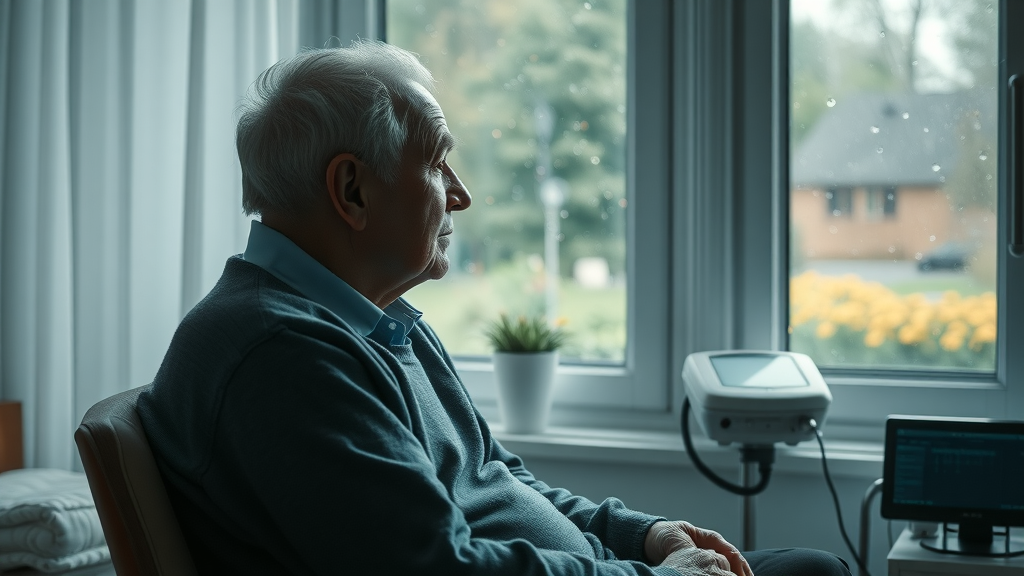Did you know over 50% of older adults struggle with poor sleep, putting their mental health and quality of life at risk?
Quality sleep isn’t just a comfort—it’s essential for senior mental wellness and sleep. In this comprehensive guide, you’ll discover the critical relationship between sleep quality and mental health, along with practical steps to help older adults achieve restful nights and brighter days. Read on to uncover actionable habits that can transform the wellness of yourself or a loved one.
Revealing the Link: Senior Mental Wellness and Sleep’s Critical Impact
Did you know that over 50% of older adults experience poor sleep, which can directly deteriorate their mental health and overall wellness? In this guide, discover how optimizing senior mental wellness and sleep can unlock a better quality of life for older adults.

Exploring Senior Mental Wellness and Sleep: Why It Matters for Older Adults
Understanding the Connection Between Senior Mental Wellness and Sleep Quality
Sleep quality powerfully influences senior mental wellness. Chronic insomnia or disrupted sleep pattern can hinder good sleep, increasing susceptibility to anxiety, depression, and memory problems for older adults. Studies highlight that sleep disorders such as sleep apnea or restless legs syndrome frequently go undiagnosed, leading to deteriorating mental health over time.
Statistics from the National Institute on Aging indicate nearly 50% of adults aged 65+ regularly report sleep problems, ranging from fragmented sleep to staying asleep through the night. These issues are correlated with higher rates of cognitive decline, slow reaction times, and reduced physical health, further emphasizing how sleep quality is vital for seniors.
Quick Guide: What You Will Gain About Senior Mental Wellness and Sleep
Key takeaways about the importance of sleep habits, how sleep quality affects mental health, and actionable insights to enhance wellness for older adults.
How Sleep Quality Affects Mental Health in Older Adults
Sleep Quality and Its Direct Impact on Cognitive and Emotional Well-being
Recent research consistently ties poor sleep to increased risk of anxiety, depression, and memory loss in older adults. For example, a multi-year study by the National Institutes of Health found that individuals with chronic insomnia scored significantly lower on cognitive tests, and many reported more frequent depressive symptoms.
A lack of quality sleep can disrupt emotional regulation, causing irritability and stress to amplify daily challenges. Older adults are especially vulnerable—without restful nights, even small setbacks can feel overwhelming, contributing to a diminished sense of well-being and exacerbating pre-existing mental health issues.
"Chronic lack of sleep is one of the leading causes of diminished mental health in seniors." – National Sleep Foundation

Common Sleep Disorders in Seniors: Recognizing the Signs
Sleep Apnea, Insomnia, and Restless Legs Syndrome
Older adults frequently encounter sleep disorders like sleep apnea, insomnia, and restless legs syndrome. Early signs may include persistent fatigue, snoring, difficulty falling or staying asleep, and leg discomfort at night. Left unmanaged, these issues impair both physical and mental health , making it crucial to recognize symptoms before they worsen.
Sleep apnea especially disrupts sleep quality in the elderly, causing repeated nighttime awakenings and reduced oxygen levels. This can lead to daytime confusion, memory lapses, and poor concentration—key risk factors for cognitive decline and diminished quality of life among seniors.
Understanding Senior Sleep Disorders and Their Impact on Mental Wellness
How Poor Sleep Habits Undermine Senior Mental Wellness
Daytime Fatigue, Irritability, and Long-Term Mental Health Risks
Symptoms of poor sleep in seniors include increased daytime fatigue, confusion, mood swings, and a reduced interest in socializing or hobbies. Over months or years, insufficient rest also raises the risk of chronic mental health problems like depression and anxiety, undermining independence and daily functioning.
Chronic poor sleep may exacerbate existing health issues such as high blood pressure and diabetes, making it even harder to maintain a good night 's rest. The cycle becomes self-perpetuating: physical ailments worsen sleep, and sleep problems trigger more severe mental health concerns.

Developing Better Sleep Habits: Practical Strategies for Older Adults
Building a Good Night Routine for Quality Sleep
Checklist for developing supportive sleep habits: Set a consistent sleep and wake time, limit blue light from devices before bed, and create a cool, dark, quiet bedroom environment. Remove electronic distractions, invest in comfortable bedding, and establish a relaxing wind-down routine—reading, gentle stretching, or breathing exercises are beneficial for older adults seeking quality sleep.
Lifestyle changes, such as daily physical activity and exposure to natural sunlight, also support physical and mental health. Regular exercise improves sleep quality, reduces stress, and can be customized to any ability level, from walking groups to gentle yoga, further promoting senior mental wellness and sleep.

Comparison Table: Effective Sleep Habits for Seniors vs. Common Sleep Disruptors |
|
Effective Sleep Habits |
Common Sleep Disruptors |
|---|---|
Consistent bedtime routine |
Irregular sleep pattern |
Daily exercise |
Daytime napping for long periods |
Dark, quiet bedroom environment |
Electronic devices before bed |
Relaxation techniques (breathing, meditation) |
Caffeine/alcohol in the evening |
Limiting fluid intake late at night |
Late heavy meals |
The Role of Physical Health: Enhancing Senior Mental Wellness and Sleep
Physical Activity, Diet, and Their Impact on Sleep Quality
Improving physical health is a pillar of senior mental wellness and sleep. Regular movement, like walking, stretching, or group exercise classes, increases deep sleep stages vital for brain repair and emotional resilience. These habits reduce risks for chronic disease and enhance mood through endorphin release.
A balanced diet plays a complementary role. Foods rich in magnesium, potassium, and lean proteins promote restorative sleep and lessen insomnia complaints. Adopting these lifestyle changes brings benefits beyond the bedroom; improved physical and mental health pave the way to a richer, more fulfilling quality of life for older adults.

Seeking Professional Help: When to Worry About Sleep Disorders in Older Adults
How to Recognize Sleep Disorders and Seek Treatment
Indicators warranting professional help include persistent trouble falling or staying asleep, loud snoring, chronic daytime sleepiness, unexplained mood changes, frequent forgetfulness, and visible declines in daily routine performance. If sleep problems last more than a month, interfere with normal activities, or coincide with new mental health symptoms, consult a healthcare provider specializing in older adults or mental health.
Frequently Overlooked Factors Affecting Senior Mental Wellness and Sleep
Social isolation, chronic illness, and use of certain medications can all contribute to sleep problems and declining mental health in older adults. Being aware of these risk factors—and addressing them proactively—can greatly improve both quality of sleep and overall well-being.
"A holistic approach to sleep and mental health can dramatically improve seniors' quality of life." – Geriatric Health Expert

People Also Ask
What is the most common mental disorder among seniors over age 65?
Depression is the most common mental health disorder among seniors over age 65, often exacerbated by sleep disorders and poor sleep habits. It can significantly impact both quality of life and physical health if left untreated.
Why do senior citizens have a hard time sleeping at night?
Factors include natural changes in circadian rhythms, medication side effects, chronic pain, and underlying sleep disorders such as sleep apnea or restless legs syndrome, making quality sleep harder for many older adults.
How many hours should a 70 year old sleep?
Most experts recommend 7–8 hours of quality sleep each night for seniors in their 70s to support mental wellness, cognitive function, and physical health.
What is best to help seniors sleep?
Best practices include adopting healthy sleep habits, addressing any medical and mental health concerns, and ensuring the bedroom environment supports relaxation and restful sleep.
Essential Tips to Improve Senior Mental Wellness and Sleep
Maintain a consistent sleep schedule
Prioritize regular physical activity
Limit caffeine and alcohol intake
Create a calm bedtime routine
Address stress and anxiety with mindfulness techniques
Consult a healthcare provider about sleep disorders

Frequently Asked Questions About Senior Mental Wellness and Sleep
Can improving sleep habits help with depression in older adults? Yes, adopting better sleep habits often leads to improvements in mood, cognitive function, and overall mental health for older adults affected by depression.
Are there natural remedies for sleep disorders in seniors? Many older adults benefit from regular exercise, relaxation techniques, and dietary adjustments—like reducing caffeine and heavy meals at night—to improve sleep quality naturally.
How can caregivers support sleep quality and mental health for seniors? Caregivers play a key role by establishing consistent routines, managing medication schedules, and promoting daytime physical activity and social interaction.
What role does diet play in senior sleep and mental wellness? A healthy diet rich in whole grains, lean proteins, and vegetables can enhance sleep quality, regulate mood, and support both physical and mental health.
Empower Your Well-being: Taking Action for Senior Mental Wellness and Sleep
Prioritizing sleep quality is vital for senior mental wellness. Start simple changes today—share this guide to help older adults in your life achieve restful nights and brighter days.
 Add Element
Add Element  Add Row
Add Row 



Write A Comment